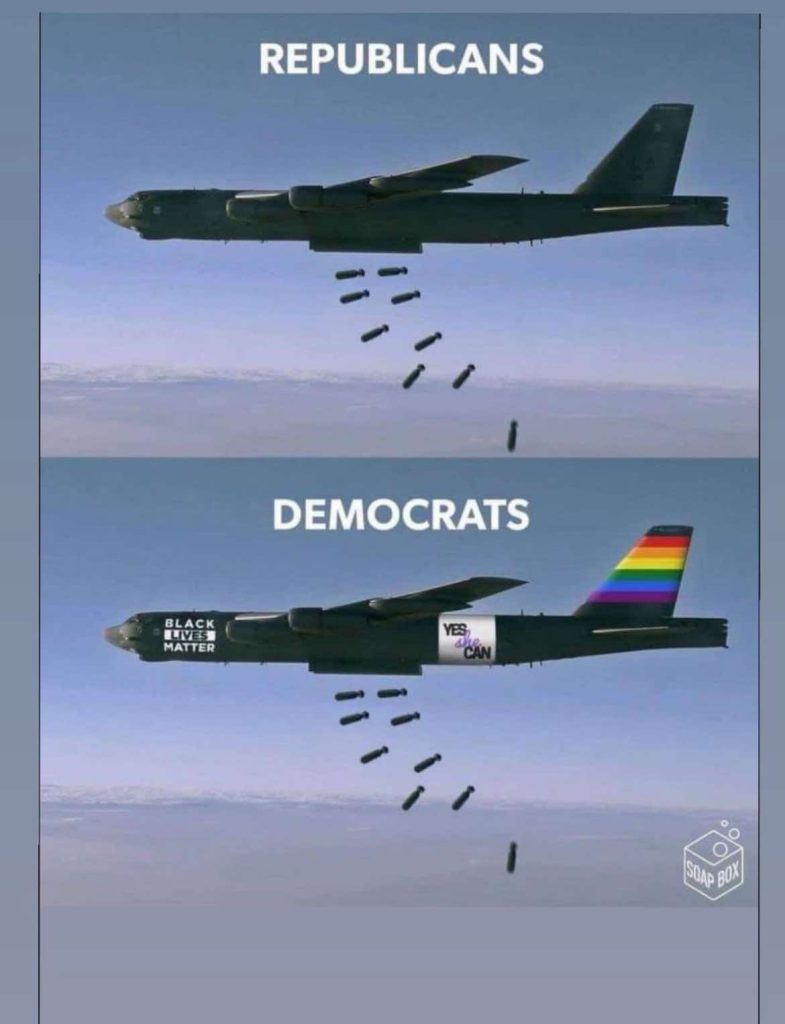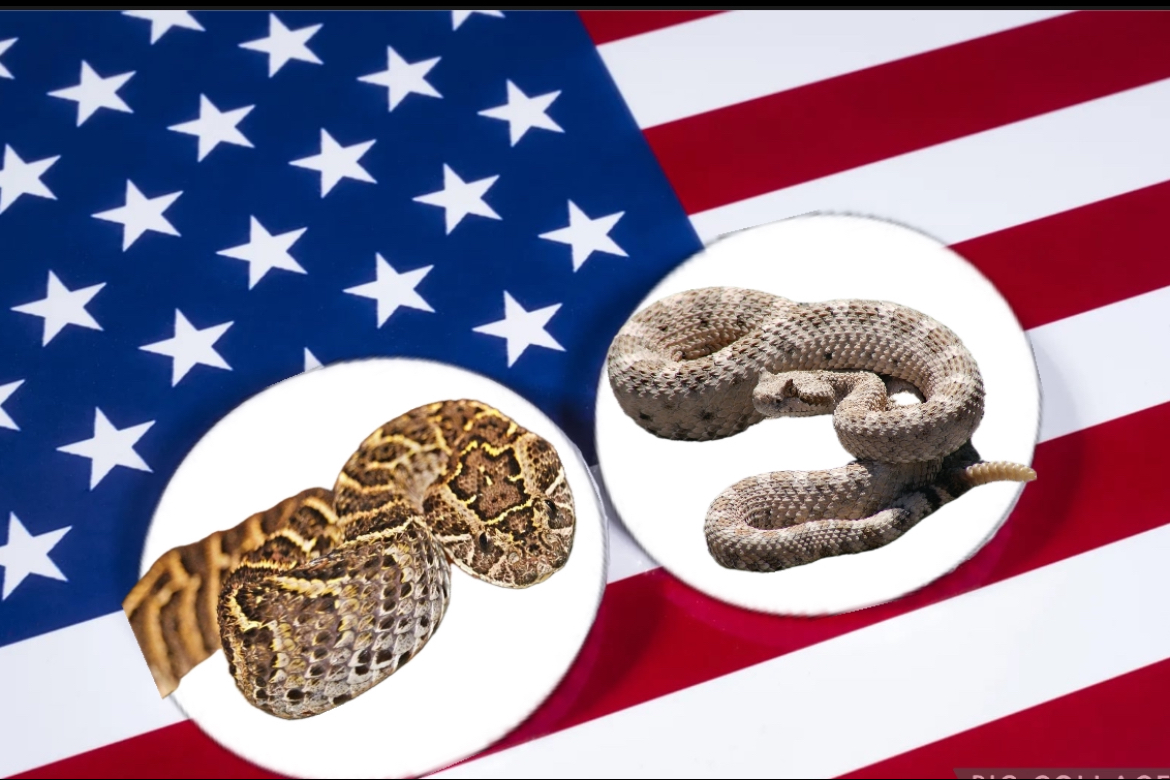Intro: Jonathan Pie Explains How Democrats Lost And Trump Won
The Rest Explains How The American Public Lost And Lose Every Time
The United States, often heralded as a bastion of freedom and democracy, presents an illusion of choice between two dominant political factions: the Democrats and the Republicans. While voters may feel they are making meaningful choices between “the lesser of two evils,” what is truly available to them could be compared to choosing between a puff adder and a rattlesnake—both venomous, differing only in approach but ultimately carrying the same potential for harm. Beneath this binary political surface lies a system rooted in a rigid constitution over two centuries old, a deeply ingrained status hierarchy, and a culture that fetishizes wealth. To critique this, Demi Moore’s words resonate with sharp clarity: “The US is built on Puritans, religious fanatics and criminals.” This observation provides a lens through which to view an electoral process that is symptomatic of a much larger, ingrained dysfunction; a system fuelled by hypocrisy, inequity, and a persistent refusal to confront its own historical baggage.
For over 200 years, the American constitution has been revered almost as a sacred document, enshrining what some claim to be timeless principles of liberty and justice. However, the reality is that this aged document was crafted by a small cadre of affluent landowners and slaveholders, and it reflects the interests and biases of its time. Today, the Constitution still dictates the parameters of governance and justice, despite the fact that American society and the world itself have evolved in dramatic ways. The result is a political system locked in archaic structures, with mechanisms ill-suited to modern complexities and driven largely by the interests of the wealthy elite. This is the same elite that, by any reasonable measure, has determined the direction of American politics since the country’s inception, leaving most citizens to choose between representatives who serve corporate donors and capitalist structures more than the public interest.
At the heart of this political spectacle is the Democrat and Republican duopoly, two parties ostensibly representing different ideologies but operating under the same fundamental logic of maintaining power, profit, and status. In their modern forms, these parties have effectively established a culture war, rather than a substantive political competition, drawing voters into a perpetual state of antagonism. The Democrats, presenting themselves as progressive and inclusive, mask their allegiance to corporate interests with carefully crafted rhetoric. The Republicans, conversely, embrace an overt alliance with capital and religious conservatism, upholding “traditional American values” that often serve as coded language for exclusionary policies. To the discerning observer, both parties are purveyors of a status quo that entrenches wealth and privilege. The platforms may appear starkly opposed, but both parties are unified in their refusal to meaningfully address the structural inequalities that define American life.

It is telling that America’s politics remain entangled with Puritanical values. The Puritans, who arrived in the early 17th century, imposed a vision of rigid moral conformity and theocratic governance. Though they are long gone, their cultural legacy persists in the obsession with “American exceptionalism,” the belief that the United States is divinely ordained to be a model for the world. This belief underpins much of American policy, leading to a paradox where the U.S. engages in foreign wars in the name of “spreading democracy” while failing to safeguard democratic principles at home. America’s Puritan legacy continues to influence domestic policies, especially in the Republican party, where personal morality is wielded as a political cudgel to stigmatize behaviours and identities outside of conservative norms. Yet the hypocrisy runs deep: those who preach family values are often caught in scandal, those who advocate freedom wield legislative power to curtail individual rights, and those who profess to be for the “common man” actively participate in dismantling social protections for the working class.
Underneath this moralistic veneer lies a brutal history of colonial violence and dispossession. The American story begins with the violent theft of Indigenous lands, a historical injustice that has been systematically erased from mainstream political discourse. Politicians in both parties are quick to boast of the “land of the free,” yet conveniently overlook that this land was acquired through massacres, forced displacement, and broken treaties with Native Americans. This erasure is no accident; it serves the myth of American innocence, the idea that the United States has always been a force for good. Such a myth is necessary for a political system that refuses to reconcile with its past, for to do so would challenge the foundational notion of American moral supremacy. By ignoring this history, the U.S. is free to posture as a democratic ideal while continuing to marginalize those it has wronged.
Vladimir Putin Explains Why The USA Never Changes No Matter The Party In Power
Putin seems to be so much smarter than Western political leaders…. pic.twitter.com/vDxaTUjdqS
— Kerry Burgess (@KerryBurgess) November 5, 2024
Adding to this hypocrisy is the fact that American politics are, in practice, controlled by a wealthy elite, a structure that mimics the landed aristocracy from which the U.S. supposedly broke away. While the country celebrates its democratic virtues, the reality is that wealth, rather than popular will, has long dictated the course of policy. The immense cost of political campaigns, escalating with each election cycle, ensures that only those with substantial resources or access to the financial networks of the elite can even consider running for office. Consequently, candidates, regardless of party, are beholden to corporate donors, lobbyists, and a complex web of financial backers who expect favourable policies in return. This financial dependency leads to a blatant disregard for the issues faced by the average citizen. For example, while the majority of Americans support healthcare reform, neither party has successfully implemented a system that ensures universal care, largely due to the influence of the pharmaceutical and insurance industries on policy.
Sociologist C. Wright Mills famously termed this relationship between wealth and political power as “the power elite.” In his view, American democracy is a façade, where elites in politics, business, and the military interchangeably control institutions, secure in the knowledge that the general populace has little real influence over decisions of national importance. This system leaves citizens choosing between representatives who are essentially loyal to the same set of interests. It is no coincidence that Democrats and Republicans both support robust military spending, often justified by vague appeals to “national security,” while infrastructure, education, and healthcare languish. These are the priorities of a nation whose leaders are less concerned with the welfare of their people than with maintaining the image of American strength and dominance.
In recent elections, this elite control has become glaringly visible, with both parties offering candidates from dynastic wealth and established power structures. The illusion of populism has grown thin as career politicians, corporate executives, and billionaire entrepreneurs increasingly comprise the pool of serious contenders. Figures like Donald Trump and Joe Biden may posture as advocates for the working class, but their personal wealth and connections to power betray a deeper allegiance to the upper echelons of society. Even ostensibly progressive voices are often drawn from similar privileged backgrounds, leaving little room for authentic representation of the working class. Thus, American democracy becomes less a system of representation and more a theatre of elite interests, where policy choices are constrained within a narrow band that safeguards existing hierarchies.
Compounding the issues of wealth and power is the dogged attachment to an outdated constitution. The U.S. Constitution is touted as a living document, yet it remains firmly entrenched in the language, ideas, and power structures of a colonial, slave-owning society. Amendments are rare, and structural reforms, such as changing the Electoral College, ending the Senate filibuster, or reforming the Supreme Court, are virtually impossible within the current framework. This rigidity is in stark contrast to other democracies, which often allow for regular updates to their governing principles in line with societal evolution. But in the United States, a country that prides itself on progress, political leaders of both parties cling to a constitution that enshrines outdated power structures like the Senate, an institution that disproportionately amplifies the voices of rural and often conservative areas. Such constitutional idolatry serves as yet another mechanism through which the elite retain control, protected by an ossified system that discourages structural change.
The failures of American democracy are not accidental; they are intrinsic to a system built by elites, for elites. The U.S. positions itself as a beacon of freedom and equality, yet its history and its current political mechanisms are littered with contradictions. From the theft of Native lands and the perpetuation of systemic racism to the entrenchment of wealth in the corridors of power, American politics is a system obsessed with maintaining the status quo. The choice between Democrat and Republican, like that between a puff adder and a rattlesnake, represents not a meaningful spectrum of options but a cleverly constructed illusion of choice. Both parties play to the myth of American greatness, but neither has the will or the structural freedom to break away from a system built on oppression, hypocrisy, and wealth.
In light of these realities, one must question the legitimacy of American democracy as it is currently practiced. When the electorate is constrained to a choice between parties that both ultimately serve corporate and elite interests, the concept of democracy becomes hollow. A true democracy would offer citizens not only representation but the power to influence meaningful changes in policy and structure. Instead, Americans are presented with a binary choice that serves to distract and divide, while the power elite remain insulated from accountability. This system, long obscured by the American myths of freedom and equality, now stands exposed for what it is: a theatre of power, inherited privilege, and deep-seated inequity. To participate in this system is, in some ways, to be complicit in its perpetuation.
Ultimately, Demi Moore’s words cut to the heart of America’s democratic delusion. The United States, built on Puritans, religious fanatics, and criminals, is now governed by an elite caste that clings to power through wealth, inherited privilege, and the manipulation of cultural anxieties. The moral and ideological claims that underpin American exceptionalism are increasingly unsustainable in the face of growing wealth inequality, social unrest, and the continuous exposure of political hypocrisy. True progress in the U.S. would require dismantling these structures and confronting the myths that have allowed them to persist. Until then, American democracy will remain less a government of the people and more a well-staged illusion, a choice between serpents, with citizens merely the captivated audience.







